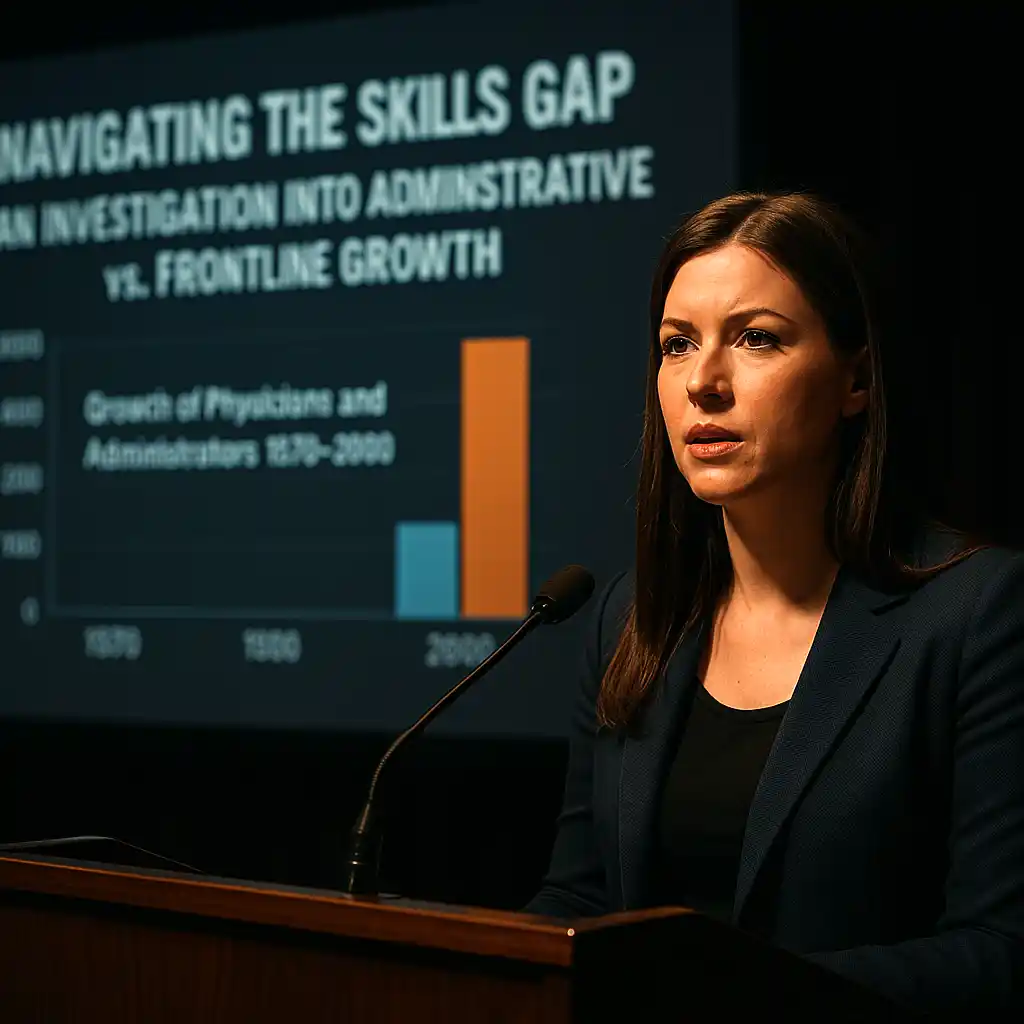Video: Navigating the Skills Gap – An Investigation into Administrative -vs- Frontline Growth
YouTube Link: https://youtu.be/fTNhxKbJMGU
Video: Canada Needs Frontline Officers, Not Middle Managers
YouTube Link: https://youtu.be/lysR1P8h7dU
In a recent video titled “Canada needs Frontline Officers, Not Middle Managers,” Canadian politician Raquel Dancho brings into sharp focus the pressing issue of an administrative growth versus frontline development imbalance. Dancho, utilizing data on the CBSA, observes that despite an increase in the agency’s budget, there has been a minimal increase in the number of frontline officers tasked with curbing gun smuggling. Instead, she notes a surge in middle management roles, suggesting a potentially misguided allocation of resources.
This situation presents a microcosm of a larger societal trend that warrants careful examination. A compelling illustration comes from a chart drawn from data by the American Bureau of Labor Statistics, NCHS, and Himmelstein/Woolhandler. Titled “Growth of Physicians and Administrators 1970 – 2009,” it reportedly reveals a growth of around 100% for physicians and a staggering 3200% for administrators, hinting at a disproportionate expansion of the administrative class. This trend has been paralleled by a per capita U.S. healthcare spending increase of almost 2500%, leading to speculation about the correlation between administrative growth and rising healthcare costs.
The trend extends beyond the confines of the healthcare sector. As Dancho’s analysis illustrates, similar patterns can be observed in other vital sectors such as border security. The concern lies not just in the numbers, but in the potential implication that the surge in administrative roles could be diminishing the effectiveness of our institutions and hindering societal and economic growth.
One crucial aspect of this discourse surrounds the societal valuation of administrative work vis-à-vis regulated professional work. If individuals are being swayed away from demanding professional pathways due to potentially equivalent or better compensation in administrative roles, this could inadvertently exacerbate societal inefficiencies and hinder our capacity to tackle real-world problems.
This begs several questions that we should put forward to researchers, economists, and policymakers. Are there roles currently classified as administrative that could be more effectively handled by frontline professionals? Could certain administrative functions be automated or optimized, thereby freeing up resources for frontline work? Moreover, what strategies could be implemented to rectify this imbalance and promote a broader societal shift towards task-oriented professional roles?
Unraveling these questions could pave the way for an optimized distribution of societal resources and labor, potentially leading to enhanced productivity and accelerated growth across various sectors. Dancho’s efforts to highlight these discrepancies serve as a stark reminder of the urgent need for balanced growth between administrative and professional roles. The hope is that her work might inspire individuals to follow suit, seeking the path of professional occupation development for the benefit of society as a whole.
As we delve deeper into these issues, it’s essential to continue examining and validating the data behind these claims. Each data point and statistical correlation provides a stepping stone towards a greater understanding of this complex issue. As we build this collective knowledge, we edge closer to addressing and potentially rectifying these societal imbalances.
Starting point for further research: https://wtfhappenedin1971.com/
STEM Team insider comments @ SGT: “To fix the problems which are no longer being addressed or improved in Canada, we think Raquel Dancho will need to work multiple roles. Perhaps as Minister of Public Safety, Minister of National Defence *****, Minister of Education and Prime Minister *****. There are not enough Dancho in government, to fix all of the problems we have. We hope she has a long career so we all learn to imitate how a professional leader is suppose to think and what a professional leader is suppose to be doing.”

Related books and resources:
“The Fifth Risk” by Michael Lewis: This book delves into the underappreciated and misunderstood roles within the U.S. government, highlighting the importance of competent administration while also shedding light on the consequences of bureaucratic growth. It offers a nuanced view of public administration that complements the concerns raised about administrative bloat.
“Lean Thinking: Banish Waste and Create Wealth in Your Corporation” by James P. Womack and Daniel T. Jones: While focused on corporate environments, the principles of lean thinking can be applied to public administration, offering strategies for reducing inefficiency and focusing resources on frontline production.
“The Checklist Manifesto: How to Get Things Right” by Atul Gawande: This book explores the use of checklists in medical practice to improve outcomes, which could be a metaphor for streamlining administrative processes in various sectors, including healthcare and border security, to focus more on frontline tasks.
“Bureaucracy: What Government Agencies Do And Why They Do It” by James Q. Wilson: This comprehensive analysis of American bureaucracy provides insights into the growth and implications of administrative roles, offering a deeper understanding of the systemic issues highlighted by Dancho.
“Reinventing Government: How the Entrepreneurial Spirit is Transforming the Public Sector” by David Osborne and Ted Gaebler: Proposes innovations in public administration that could reduce bureaucratic bloat and enhance the effectiveness of frontline workers.
“Upstream: The Quest to Solve Problems Before They Happen” by Dan Heath: Offers insights into how focusing on preventive measures and frontline activities can reduce the need for extensive administrative structures.
“Drive: The Surprising Truth About What Motivates Us” by Daniel H. Pink: While not directly about administrative vs. frontline roles, this book offers insights into motivation that could be key to understanding and improving productivity in both areas.
“Who Gets What — and Why: The New Economics of Matchmaking and Market Design” by Alvin E. Roth: Provides a unique perspective on how market design and allocation can be applied to optimize labor distribution between administrative and frontline roles.
“Public Administration: Understanding Management, Politics, and Law in the Public Sector” by David H. Rosenbloom, Robert S. Kravchuk, and Richard M. Clerkin: This text offers a foundational understanding of public administration, which can inform discussions on the balance between administrative and frontline needs.
“The Innovator’s Prescription: A Disruptive Solution for Health Care” by Clayton M. Christensen, Jerome H. Grossman, and Jason Hwang: Provides insights into how innovative solutions can transform healthcare, reducing administrative burdens and focusing resources on frontline care.
To see our Donate Page, click https://skillsgaptrainer.com/donate
To see our Instagram Channel, click https://www.instagram.com/skillsgaptrainer/
To see some of our Udemy Courses, click SGT Udemy Page
To see our YouTube Channel, click https://www.youtube.com/@skillsgaptrainer

